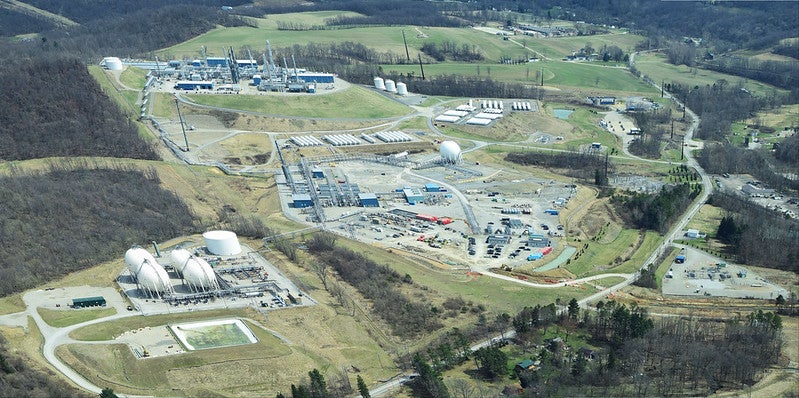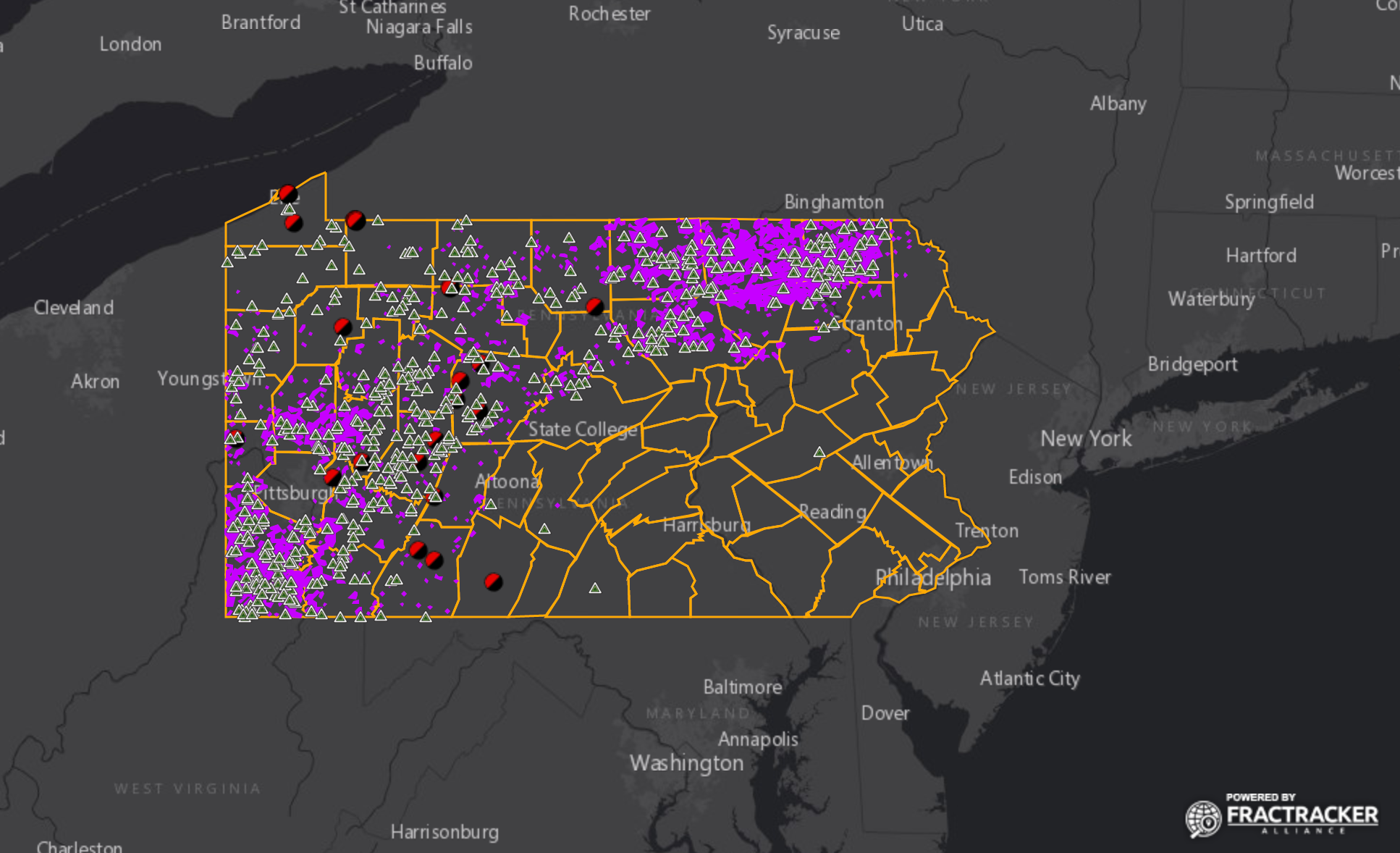‘Cancer-causing’ chemicals found in children living near fracking well sites following two-year investigation
One nine-year-old had levels of toxic chemicals in his body up to 91 times the average American, and much higher than those in an adult cigarette smoker, writes Louise Boyle


Politicians and environmental activists are demanding action on fracking after a two-year investigation revealed alarming levels of toxic chemicals linked to the drilling method in children.
A series of in-depth reports, published by non-profit Environmental Health News (EHN) this month, looked at the health impacts on five, non-smoking families living within miles of fracking sites in southwest Pennsylvania.
The US has become world leader in fossil fuel production due to fracking, or hydraulic fracturing. The technique recovers gas and oil pockets from shale rock by drilling horizontally and then injecting gallons of water, sand and chemicals underground at high-pressure.
The practice is highly controversial with anti-fracking campaigners pointing to its links to serious illnesses like cancer, poisoning of water resources, air pollution, threats to wildlife and contribution to the climate crisis.
Over a two-month period in 2019, dozens of air, water, and urine samples were taken from families in Washington and Westmoreland counties near Pittsburgh, some of the most heavily-fracked areas in the US. The samples then underwent lab analysis, according to the report, to test for 40 chemicals most commonly found in fracking site emissions.
Read more:
- Can Saudi Arabia, the world’s second largest oil producer, become a global force tackling the climate crisis?
- Majority of economists say benefits of reaching net zero by 2050 outweigh costs, survey finds
- Greta Thunberg takes aim at global trade emissions in Suez Canal meme
- How is bitcoin fuelling climate change?
According to EHN, the samples from a 13-year-old boy living in rural Scenery Hill, Washington County, came back positive for 11 industrial chemicals, including benzene, naphthalene and toluene, which studies show are associated with fracking.
The boy’s siblings and parents also showed elevated biomarkers for these chemicals and others linked to fracking, at higher than national averages. (Biomarkers are an indication that a biological process in the body has happened or is ongoing, and can be used to show that the body has been exposed to a chemical, toxin or other environmental impact.)
About nine miles away in Fredericktown, a nine-year-old boy was found to have breakdown products of harmful chemicals in his urine samples, at up to 91 times as high as the average American, and significantly higher than the average adult cigarette smoker.
The chemicals found in the samples have been linked to cancers, organ damage, neurological issues and skin and respiratory problems.
"This is yet another study showing the harms of what Pennsylvania is surrounded by, whether it's waste or industry with compressor stations or pipelines or frack-pads,” Pennsylvania State Senator Katie Muth told The Independent. “Why is this allowed to happen? This is completely preventable.”
The threat to human health from fracking has been the subject of mounting studies.
A Harvard study last year found that radiation levels downwind of fracking sites are significantly higher than background levels. Radioactive particles can be inhaled and increase the risk of lung cancer. Another study found fracking was associated with early infant mortality. Meanwhile separate research found that the poor in Pennsylvania are unequally exposed to pollution from unconventional gas wells.
The EHN investigation stressed that its pilot study, the first of its kind in the state, could not draw “sweeping scientific conclusions”.
“Instead, we hope our findings will provide a snapshot of environmental exposures in southwestern Pennsylvania families and help pave the way for additional research,” the report noted.
Dave Brown, a toxicology expert who advised on the report, told TruthOut that policymakers should be alarmed.
“What would be the explanation of this, other than these people have potential exposures to these gas fracking chemicals?” Mr Brown said.
For environmentalists, the EHN study is further confirmation of the threats that fracking poses to residents’ health and safety.
Megan McDonough, Pennsylvania state director of environmental group Food & Water Watch, told The Independent: “Over the years research has documented harms linked to fracking on everything from pipelines and compressor stations, to the toxic radioactive waste created by drilling.

She added: “This research is just a small snapshot of the actual harm which continues to be done to Pennsylvanians. And unfortunately, I think that the vast majority of our state administration wants to ignore that.
“We’re seeing cancer-causing chemicals in children’s bodies in southwestern Pennsylvania. There are also families grieving the loss of their children here due to rare bone cancers.”
In four counties surrounding Pittsburgh, where more than 3,500 drilling wells have appeared in the past 15 years, dozens of children and young adults have been diagnosed with Ewing sarcoma, an extremely rare form of bone cancer, along with other forms of cancer, the Pittsburgh Post-Gazette first reported in 2019.
Ewing has no known environmental cause, and gas industry officials say there is no evidence linking paediatric cancer to drilling. But the families nevertheless suspect that drilling and fracking played a role.
Pennsylvania’s Democratic Governor Tom Wolf subsequently committed $3 million to two studies looking at health impacts of the fossil gas industry.
One study will use existing research that linked natural gas activity to medical conditions like asthma and, applying the same methodology, try to replicate those earlier findings in the population in southwestern Pennsylvania.
The other study will focus specifically on rare childhood cancers, including Ewing sarcoma, with researchers looking at whether these young cancer patients were exposed to fracking more often than a control population.
But Ms McDonough questioned how effective the study would be. She claimed that the government studies would not look at the radioactive waste streams associated with fracking.
She added: “I think it’s no mistake that Governor Tom Wolf chose three years to do this study as he’ll be out of office by then and get to kick the can down the road to someone else.”
The Democratic governor’s spokesman toldThe Independent in an email that Mr Wolf was “committed to upholding Pennsylvania’s constitutional promise of clean air, pure water, and to protecting public health”.
The spokesman went on to blame the previous administration under Republican Governor Tom Corbett, “which promoted the rapid expansion of natural gas development and profit above these other priorities”.
He added: “This administration has acted aggressively to address the previous administration’s regulatory failures, remove restrictions on enforcement, and has put in place new regulations to hold natural gas companies to some of the most stringent environmental standards anywhere in the country in order to protect public health and the environment.”
The Independent has contacted the University of Pittsburgh, which has been contracted by the Wolf administration to conduct the studies, for comment.
Fracking is a tense subject in Pennsylvania and became a flashpoint in the crucial swing state during the 2020 presidential election. The gas industry has flushed money into some local economies where it stepped into the shoes of former heavyweight industries like steel and coal. In some places it has divided communities, with the promise of relatively good-paying jobs butting up against others’ fears for their long-term health and the environmental toll.
Despite mixed signals on the campaign trail, President Biden ultimately said he would not ban fracking (and in fact is unable to without the support of Congress). His administration is currently undertaking a months-long review which could lead to a long-term ban on federal leases or other steps to discourage drilling and reduce emissions.
Following the Environmental Health News findings, more than two dozen lawmakers on both sides of the aisle sent an open letter to Governor Wolf urging him to expand upon the pilot study.
“This study adds to an ever-growing mountain of evidence comprising more than 10 years of epidemiological studies from across the United States that demonstrate a connection between a person’s proximity to shale gas development and a host of negative human health conditions, significant ecological impacts, and dire economic projections for the affected individuals,” the letter reads.
“We urge you to use the state’s dedicated funds to thoroughly study the health impacts of fracking implementing this biomonitoring approach. Further, we are requesting that these taxpayer-funded, scientific studies include radioactivity exposure evaluations and a source exposure analysis so that the specific cause of harm is identified.”
State Senator Muth, one of the legislators who signed the letter, said Governor Wolf had not responded. The Democrat represents Pennsylvania’s 44th district, outside of Philadelphia, but grew up in the area where the investigation into fracking took place.
She said the bipartisan letter was intended to reiterate the importance of not wasting taxpayer money on fracking studies which did not take into account all factors.
Sen Muth sits on the Environmental Resources and Energy Committee but said that she believed there would be little appetite from Gene Yaw, the committee’s Republican chair, to hold a hearing into the findings of EHN’s two-year investigation.
“The chair is among the number one supporters of the [fracking] industry in Pennsylvania’s General Assembly,” Sen Muth said.
“Our governor denies this is harmful. What do you do when government doesn't believe evidence that's harming people?”
In an email Nick Troutman, chief of staff for Senator Yaw, told The Independent: “This particular study by EHN is obviously another Heinz-Foundation-funded project attacking shale. EHN received $1.4 Million from the Heinz Foundation. With respect to this particular report, even the authors acknowledge that the work is not peer reviewed, is unpublished in scientific journals, and ‘should not be used to make scientific determinations’. At this time, no hearings will be scheduled. “
Environmental Health News said that the remarks from Senator Yaw’s office were “not factually correct”, in an email to The Independent.
EHN said that while Heinz Endowments had provided funding to the organization, it had no impact on its investigative reporting.
“EHN is an editorially independent nonprofit newsroom; funders have no influence over what we cover or how we cover it,” the statement read.
This article has been updated to include the response from Senator Yaw’s office. This article has been subsequently updated to include a response from Environmental Health News.
AP contributed to this report
Join our commenting forum
Join thought-provoking conversations, follow other Independent readers and see their replies
0Comments